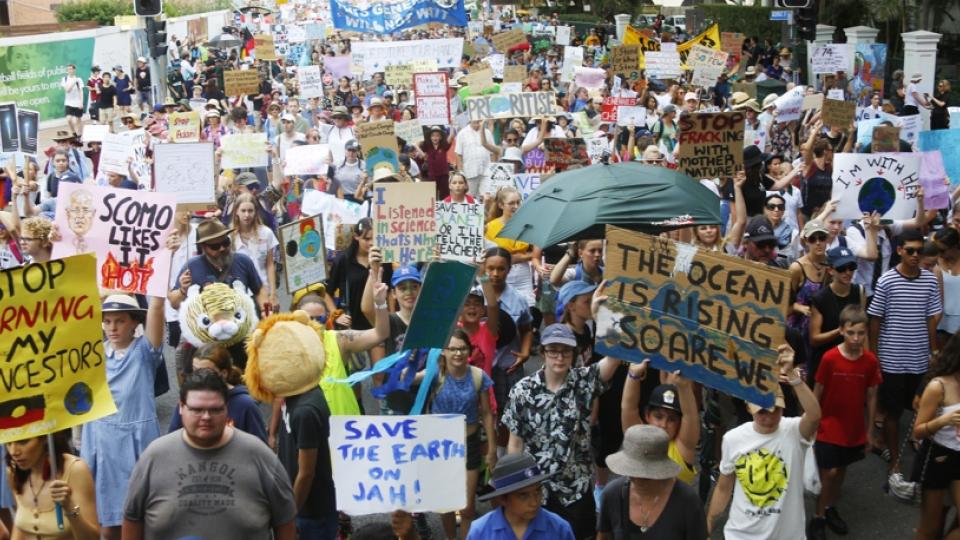The climate action we need today

While the global coronavirus pandemic dominates local and international attention, the climate crisis continues to worsen.
Climate tipping points are being passed and the Coalition government, Labor and the Greens are failing to come up with an adequate plan to meet this existential challenge.
Wildfires are out of control in the west of the United States. The last fully intact ice sheet in the Canadian Arctic collapsed earlier this month. Australia was rocked by unprecedented bushfires last year, made much worse by climate change, and serious fires have already started in New South Wales — in winter!
No wonder climate scientists are in despair, as are millions who want real action now.
The federal government’s plan for a post-pandemic gas-led recovery shows it has utterly abandoned our interests.
We also need better than what Labor or the Greens are offering.
Labor continues to pay lip service to the climate challenge, with leader Anthony Albanese recently offering to back the federal government's technology road map, including carbon capture and storage, and more gas-fired energy.
Albanese recently said: “Part of what any modern party with any self respect will be about is dealing with the challenge of climate change.”
He was responding to right-wing frontbencher Joel Fitzgibbon’s veiled threat to split the ALP.
Fitzgibbon implicitly acknowledged that Labor is trying to walk both sides of the street on climate change. It is “not possible these days” to “say one thing on one side of the continent and another thing on the other and get away with it”, he lamented.
Fitzgibbon is unambiguously backing the fossil fuel industry and Albanese is trying to walk both sides of the street.
At the same time, the Greens are highlighting the tenth anniversary of the 2010 election by pushing for a new Labor-Green “pact” to combat climate change.
Nobody can blame the Greens for floating an arrangement that would help keep the conservatives out of government.
However, Greens leader Adam Bandt is exaggerating the achievements of the Julia Gillard-led ALP government that had Greens support. He is trying to reinforce a myth about the Greens/ALP carbon price.
“In recent Australian history, there is one indisputable fact,” he said in a party speech. “The only time that climate pollution meaningfully dropped is when the Greens shared power.”
The fact is indisputable, but the implication is false.
As Green Left pointed out in 2013: “Renewable energy use has indeed risen and coal use has fallen in the past 12 months, but the claim that the carbon price is responsible is pure misinformation ...
“Black coal use fell in NSW [in that period], but the biggest single reason was the closure of the energy-guzzling Kurri Kurri aluminium smelter, not the carbon price. Coal use fell in South Australia too, the biggest reason being the planned closure of a very old coal-fired plant in Port Augusta.
“Brown coal use fell in Victoria, but a big factor here was the disastrous (and, ironically, climate change-induced) flooding of the huge Yallourn coal-fired power plant and nearby coalmine, which sharply cut its operations for many months.”
There were other reasons for the reduction in emissions during that period, including the Renewable Energy Target.
The carbon price policy had many flaws, including a miserably low 5% emissions reduction target and ongoing large subsidies to some of Australia’s dirtiest polluters.
Under the policy, billions of dollars were paid to Victorian brown coal-fired power stations while, as Environment Victoria said at the time, “their businesses are relatively unaffected by the carbon price”.
These also are indisputable facts.
Ironically, then-Prime Minister Tony Abbott’s abolition of the carbon price — before its biggest failure became manifest — is arguably more responsible than anything else for its relatively good reputation today.
The failure I’m referring to was its projected incorporation into the European Emissions Trading Scheme — an utterly failed mechanism. Had this happened, it would be very clear that it was not a transformative climate policy.
Yet, the Greens were promoting this at the time.
The Greens’ climate policy has improved since then, although last year’s federal election was the first in which it pushed 100% renewable energy policy (despite the fact that Beyond Zero Emissions had convincingly demonstrated it was feasible almost a decade before). However, a revamped carbon price remains part of of its policy and, in practice, is what it believes will be the main driver to reduce emissions.
Socialist Alliance does not believe that market mechanisms are up to the task of reducing emissions with the certainty and at the scale required today. The policy we took to last year’s federal election was to set emissions cuts targets to reduce net emissions to zero as soon as possible, and a target to achieve 100% renewable energy within a decade.
There is no adequate alternative to a government mandate that industrial emissions must be reduced according to a phased, but rapid, plan.
The best way would be to simply take the energy and mining sectors directly into democratic public ownership, so that emissions reduction could be democratically and systematically managed.
This would also be the best way to ensure that communities and workers have sustainable and guaranteed livelihoods during and after the transition.
People are clocking how the government’s response to the pandemic demonstrates how feasible it is to make dramatic changes in a short period of time.
As Greta Thunberg said: “It shows that in a crisis, you act, and you act with necessary force”.
That’s the kind of climate action plan we need today.
[Alex Bainbridge is the national convenor of the Socialist Alliance.]